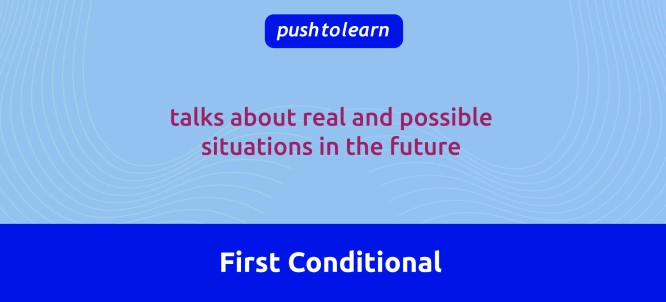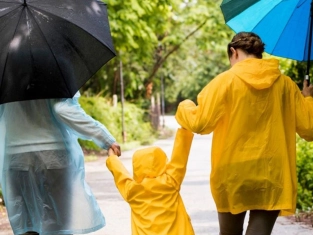by PushtoLearn
First Conditional
Table of Contents
First Conditional – Exercises
These exercises focus on First Conditional
TLDR
✔️ First Conditional = Possible future situations (If + Present, Will + Verb)
✔️ NEVER use "will" in the if-clause!
✔️ Use "might," "can," or "may" instead of "will" for different meanings
✔️ "Unless" = "If not"

What Is the First Conditional?
The First Conditional is used for:
✔️ Possible future events → "If it rains, we will stay inside."
✔️ Likely consequences → "If you study, you will pass the exam."
✔️ Warnings and promises → "If you touch that, you will get burned!"
First Conditional Structure
👉 If + present simple, will + base verb
✔️ Examples:
-
If you eat too much, you will feel sick.
-
If she calls me, I will answer.
-
If they win the game, they will be champions.
📌 Tip: The "if" clause describes the condition (present simple), and the main clause shows the result (will + base verb).
First Conditional Variations
🔹 Using "can", "may", or "might" instead of "will"
✔️ If you study, you can pass the exam. (Ability)
✔️ If you hurry, you might catch the train. (Possibility)
✔️ If it’s sunny, we may go to the beach. (Possibility)
🔹 Using imperatives
✔️ If you see Tom, tell him to call me.
✔️ If you finish early, come and help me.
🔹 Using "unless" ( = if not)
✔️ Unless you study, you will fail. (= If you don’t study, you will fail.)
✔️ Unless it rains, we will have a picnic. (= If it doesn’t rain, we will have a picnic.)
First Conditional vs. Zero Conditional
|
Feature |
First Conditional |
Zero Conditional |
|
Meaning |
Possible future situations |
General truths & facts |
|
Tense |
If + Present Simple, Will + Base Verb |
If + Present Simple, Present Simple |
|
Example |
If it rains, we will stay inside. |
If it rains, the ground gets wet. |
|
Can "if" be replaced with "when"? |
No, because the future is uncertain. |
Yes, because it’s always true. |
📌 Tip: If the result is always true, use the Zero Conditional. If it’s possible but not certain, use the First Conditional.
Common Mistakes in First Conditional
|
Mistake |
Incorrect |
Correct |
|
Using "will" in the if-clause |
If she will call, I will answer. |
If she calls, I will answer. |
|
Using the present tense in the result clause |
If it rains, we stay inside. |
If it rains, we will stay inside. |
|
Using "would" instead of "will" |
If you study, you would pass. |
If you study, you will pass. |
📌 Rule: NEVER use "will" after "if"! The if-clause is always in present simple.
Compare other Conditionals: Zero Conditional, Second Conditional, Third Conditional, Mixed Conditionals.
FAQ: Common Questions About the First Conditional
Can I use "will" in the if-clause?
➡️ No! The if-clause is always in present simple.
❌ If you will study, you will pass.
✅ If you study, you will pass.
Can I use "unless" instead of "if not"?
➡️ Yes!
✔️ Unless you study, you will fail. (= If you don’t study, you will fail.)
What’s the difference between "if" and "when" in First Conditional?
➡️ "If" = Possible situation
➡️ "When" = Certain situation
✔️ If it rains, we will stay inside. (Maybe it will rain.)
✔️ When it rains, we stay inside. (It always happens.)
Can I use "might" or "can" instead of "will"?
➡️ Yes, but it changes the meaning!
✔️ If you study, you might pass. (Possibility)
✔️ If you study, you can pass. (Ability)

